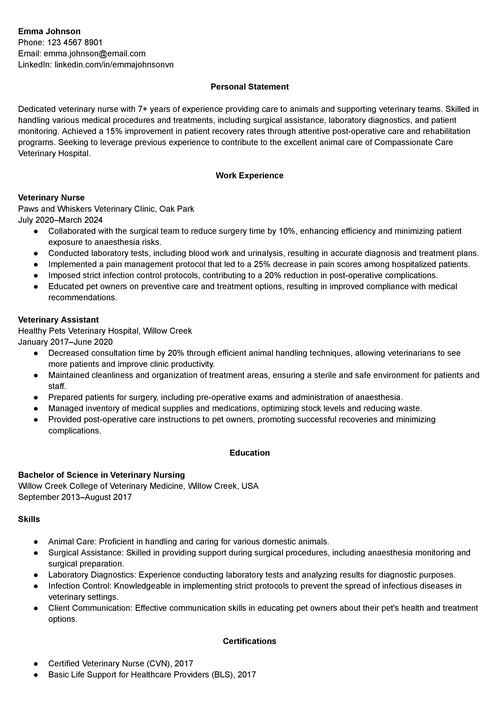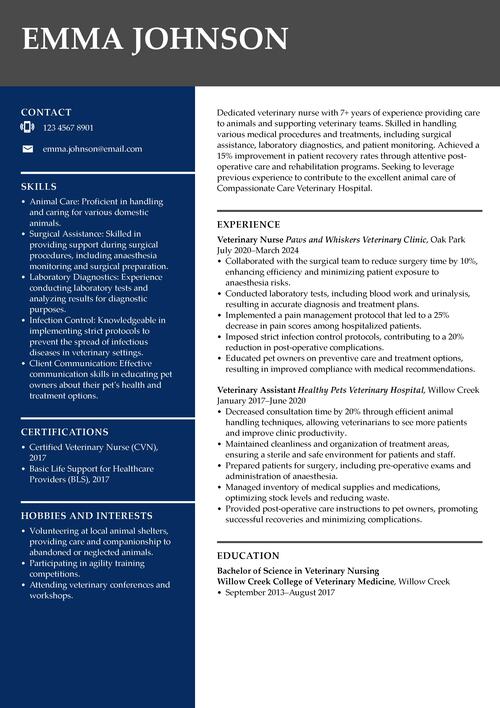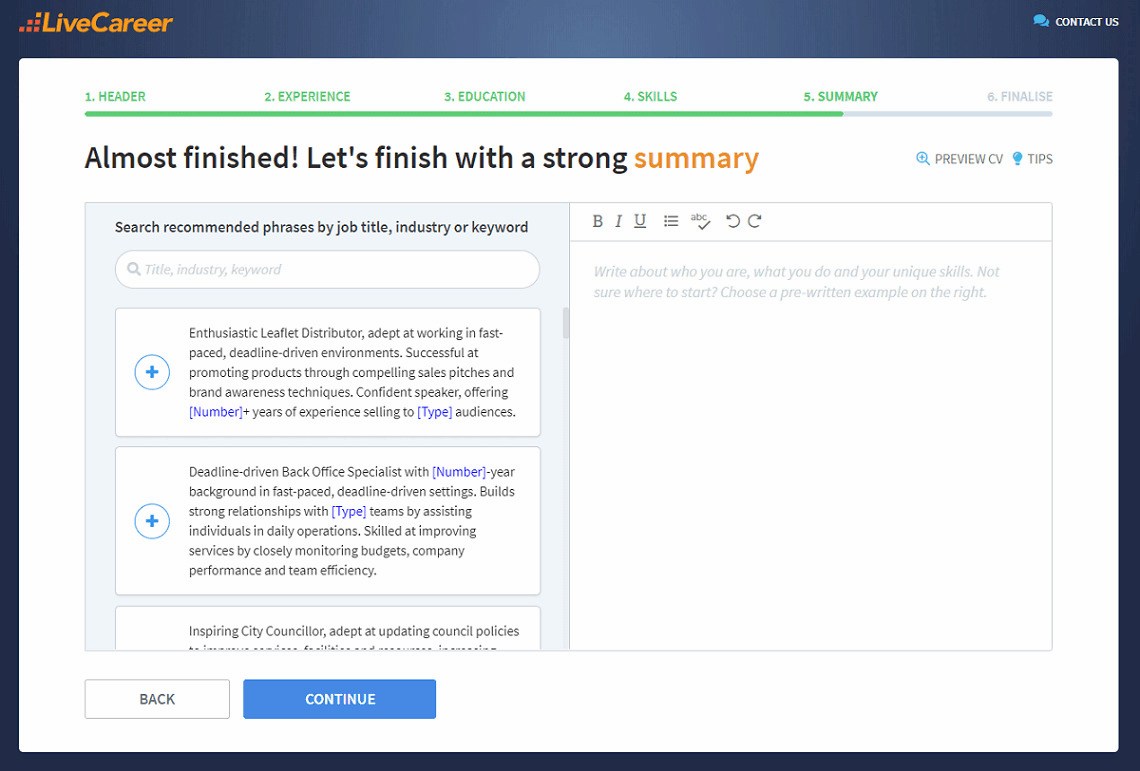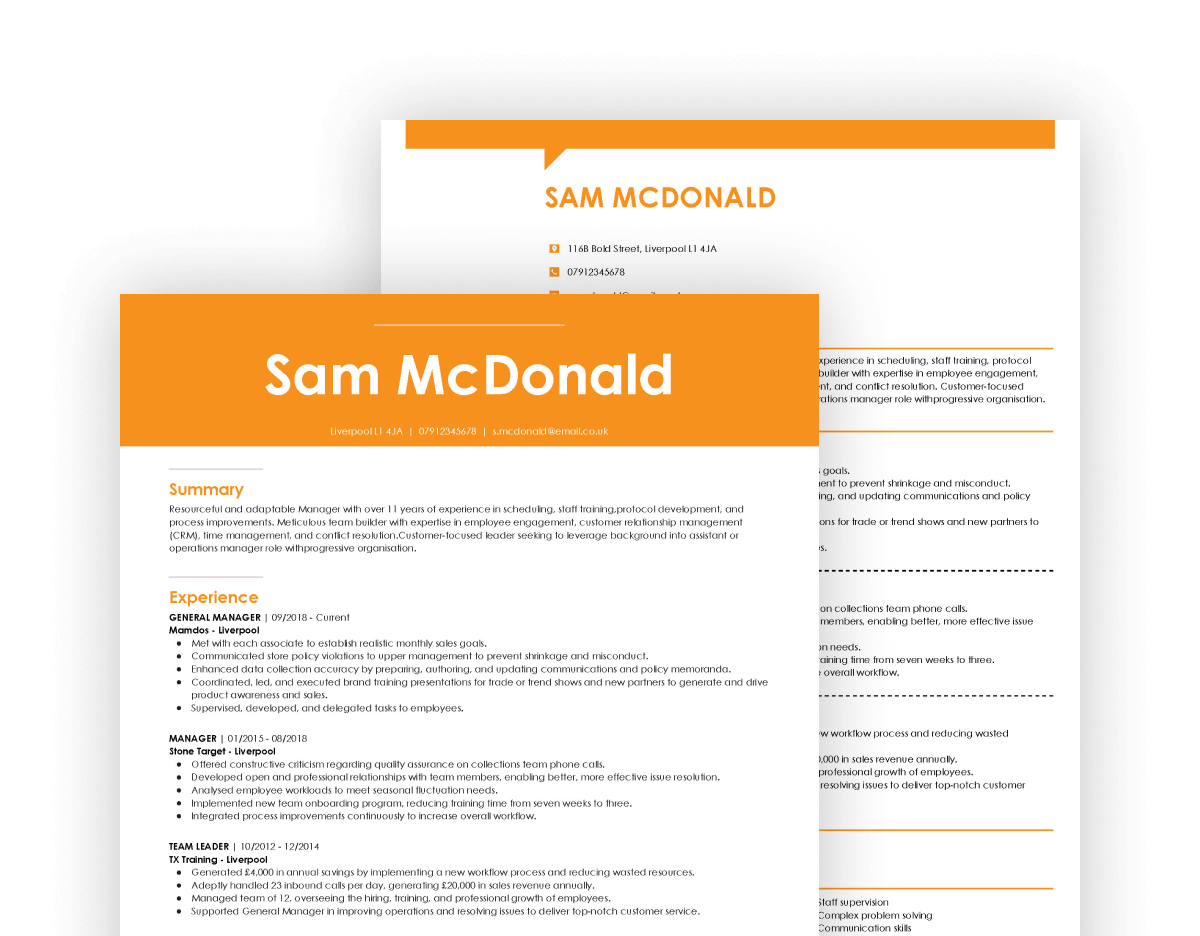Create a professional CV now!
 NO
NO YES
YESOur customers were hired by:
Whether a fresh-faced graduate or a seasoned professional seeking a change, you might feel stressed in the face of job searching. And that’s completely understandable. Job hunting isn’t always a breeze, and it requires careful planning.
In this guide, I'll help you tackle the challenge, offering insights on how to get a job, especially if you have no initial experience. Read on for a comprehensive guide that helps you get the job you’ll love.
Create an effective CV in minutes. Choose a professional CV template and fill in every section of your CV in a flash using ready-made content and expert tips.
Create a professional CV now!
 NO
NO YES
YESWe created the sample on the right using our builder. See other good CV examples like this one.
Seeking more guidance before stepping onto the new career path? Check:
Now, let’s move to the main part of this article—how to get a job, whether it’s in the UK or anywhere abroad:
Every job search kicks off with a genuine self-assessment. Pause and ponder your strengths, skills, and competitive advantages first. Take a sincere look at the traits and qualities that make you stand out as a candidate, especially if you’re a fresh graduate with no experience.
Once you've got a handle on that, clarify your career goals and aspirations, ensuring they align with your abilities. Determining your objectives and ambitions might be tough initially, so consider consulting a career coach or a mentor. They might help you orient toward the job you’ll truly enjoy.
Is there any dream role you see yourself in? Are you particularly drawn to a specific industry? Answering these questions might help decide where to look for jobs first.
Start by exploring job boards like Indeed, Glassdoor, and LinkedIn, which compile listings from various industries. Signing up for job alerts on these platforms ensures you receive notifications for roles that match your criteria.
Regularly search for jobs online, using specific keywords related to your skills and desired position to narrow down results. Additionally, visit potential employers' websites to check for openings that may not be advertised elsewhere.
In today's digitally connected world, it's crucial to utilise networking sites like LinkedIn. Actively engage with professionals in your field, join relevant groups, and attend virtual networking events to boost your visibility. You never know who you might attract or what opportunities might arise.
Wondering how to find a job and get noticed by recruiters? Fine-tune your LinkedIn profile. Ensure it’s complete and current, containing your professional photo and an engaging summary highlighting your best achievements and competencies.
Keep your profile fresh by updating it regularly with recent projects, certifications, and rewards. You can also engage with industry professionals through shared articles to establish yourself as the one knowledgeable about industry trends. Lastly, expand your network by connecting with recruiters, hiring managers, and industry professionals to increase your visibility to potential hires.
A strong CV summary will convince the recruiter you’re the perfect candidate. Save time and choose a ready-made personal statement written by career experts and adjust it to your needs in the LiveCareer CV builder.

Found the job offer that ignites your enthusiasm? It’s the perfect time to craft a compelling CV that conveys all your talents and abilities. Start strong with a professional summary (or objective statement if you have no experience) to give recruiters a snapshot of your qualifications and career goals.
Then, list relevant experience, skills, and achievements that complement your profile. Use action verbs and concrete examples to showcase your impact in previous roles.
What’s equally important, tailor your document to the original job description to highlight your suitability for the position and to please Applicant Tracking Systems. Finally, check your CV for clearance, readability, and correctness.
In addition to your CV, write a personalised cover letter introducing yourself to potential employers and expressing your motivation for the position. There’s no better means than a cover letter to articulate how your skills and experiences make you a perfect fit for the role.
Customise your cover letter for the specific job application, addressing the hiring manager by name if you possess such details. Keep the document to the point, following a proven cover letter structure. Focus on why you are uniquely qualified for the position and how you can contribute to the company's success. That’s what makes a perfect cover letter.
Your CV and an application letter got noticed? Excellent. If invited for that long-awaited interview, thoroughly research the company (if done earlier, do it twice). It will help you grasp their mission, values, products, target market, and recent achievements. Recruiters often inquire about these during interviews, and it's an opportunity to demonstrate your genuine interest in the position.
Practice common interview questions and plan how you’ll showcase your skills and experiences with specific examples. You can utilize the STAR method to structure your responses better, providing specific examples of how you’ve successfully handled challenges or achieved results in previous roles. Ask a friend to help you go through common interview questions, or use an online interview simulator for a real-life experience.
After the interviews, consider sending a thank-you email or note to express your appreciation for the opportunity. It reaffirms your interest and adds 10+ to your professionalism. If you have not received a response from the employer within the expected timeframe, write a polite email or call to ask about the status of your application. Staying engaged with the hiring process can help keep you top-of-mind with employers and increase your chances of success.
Identify areas where you may need to develop further or acquire new skills (whether soft skills or hard skills). Look for growth opportunities, and consider how you can leverage your strengths to contribute to your success in the job market. You'll be better positioned to proceed through the job search process by clearly understanding your capabilities and aspirations. It’ll also help you focus on opportunities that align with your professional goals.
Job searching can be challenging, thus it demands loads of patience and resilience. Stay persistent in your efforts, and don't get discouraged by setbacks or rejections. They’re all a natural part of the tedious recruitment processes that might take weeks and months. Keep applying to relevant opportunities, network with professionals in your field, and seek new learning opportunities. Maintain a positive attitude and believe in your abilities to stay motivated and focused on achieving your job goals.
Already figured out how to find a job and received an offer? Congratulations! It's time to negotiate the terms and conditions of your contract. Research industry standards and salary benchmarks to ensure you’ll be paid fairly for your valuable skills and experience. Consider negotiating other aspects of the offer, depending on what matters most. You may want to check the work model, benefits, holiday allowance, or training opportunities. Be prepared to advocate for yourself and clearly communicate your needs and preferences to the employer.
You don’t have to be a CV writing expert. In the LiveCareer CV builder you’ll find ready-made content for every industry and position, which you can then add with a single click.

Thank you for reading my article about how to get a job in the UK. I hope that your job hunt will go as smoothly as possible. If you have any questions, feel free to leave a note in the comments section.
Our editorial team has reviewed this article for compliance with Livecareer’s editorial guidelines. It’s to ensure that our expert advice and recommendations are consistent across all our career guides and align with current CV and cover letter writing standards and trends. We’re trusted by over 10 million job seekers, supporting them on their way to finding their dream job. Each article is preceded by research and scrutiny to ensure our content responds to current market trends and demand.
About the author
Since 2013, the LiveCareer UK team has shared the best advice to help you advance your career. Experts from our UK editorial team have written more than one hundred guides on how to write the perfect CV or cover letter.
Rate this article:
How to get a job
Average:

Is ‘please find attached my CV’ the right statement? See alternatives to ‘please find my CV attached’ and check when you might need to use them.
This guide explores the advantages and pitfalls of leveraging ChatGPT to create a CV. See how to make your own ChatGPT CV step-by-step with our tips.
A decent CV ready in minutes and without effort? Sounds good, but is it even doable? Check which free AI CV maker can take some work off your hands.
Our customers were hired by: